Anthony McIntyre's Blog, page 1184
October 4, 2017
Sinn Féin - The Bullies' Party
 Via The Transcripts Deirdre O’Shaughnessy speaks to former Sinn Féin now Independent Cork County Councillor from the Cork East constituency, June Murphy. Ms Murphy left the party two years ago due to bullying and is speaking publicly for the first time on the subject in this interview. Opinion LineCork’s 96FM Audio Player
Via The Transcripts Deirdre O’Shaughnessy speaks to former Sinn Féin now Independent Cork County Councillor from the Cork East constituency, June Murphy. Ms Murphy left the party two years ago due to bullying and is speaking publicly for the first time on the subject in this interview. Opinion LineCork’s 96FM Audio Player
June Murphy Cork’s 96FM 15 September 2017
Deirdre: Limerick County Councillor Lisa Marie Sheehy recently left Sinn Féin citing bullying and a culture of bullying throughout the party. But she’s only the most recent departure from the party. Previous to this there have been a number of high-profile departures in Cork City and county, predominately in the county, but none of those who left have spoken out about their reasons. Today, I’m speaking to Councillor June Murphy and it’s her first time going on the record about leaving Sinn Féin and why she left. June, you were first elected for Sinn Féin in 2014.
June: That’s right.
Deirdre: Tell me a bit about how you joined the party and how your election came about initially.
 June Murphy
June MurphyJune: I suppose I was in the party a number of years ago. I would have run for Sinn Féin in 2002 in the general election and I had left the party for some time and I moved out of the area. And when I came back I was spotted and members of the Fermoy Cumann contacted me through Facebook asking to meet me. So I met them. And I left that night and I thought to myself: No way. Right? So I got a phone call then from a person in Sinn Féin and he had actually told them not to come near me that he wanted to meet me himself. So he asked would I’d meet him. I said I would and I met him in the Firgrove in Mitchelstown and we went over things. He was telling me about the state of the area – that it had been inactive for years, that it needed to build the structure, build the party in the area – that what was there were doing nothing. So my understanding was my role was to be brought back in and to start building, building on the party in the area. So that’s what I did. He said it had completely changed. It was more professional. You know, it all seemed very new and changed and I felt excited about it, you know? And you know just wanted to see how it had changed and so on. So we did and from that moment on the next year was an absolute nightmare. So you know and Sinn Féin were on a bit of a crest as well at that stage but the amount of hassle that I had during those short few weeks was, I thought I was – I couldn’t believe it, like. You know, there was constant changing of canvassing dates. I would a get a text from Fermoy telling me that, you know, we’re going canvassing, such and such,then I’d get a phone call from that organiser and he would change the times but not tell his own cumann…
Deirdre: …Okay…
June: …so then they blamed me.
Deirdre: So was it deliberate do you think? Or was it just disorganised?
June: Oh, absolutely! Absolutely.
Deirdre: It was deliberate.
June: I believe it was, like.
Deirdre: From Day One.
June: Yeah, but I didn’t realise it at that stage, you know. Because to be honest with you I didn’t realise I was actually walking into the middle of a civil war and that’s the only way to describe what was going on in East Cork.
Deirdre: And I suppose Cork East isn’t the only part of the party now where these problems have arisen.
 The Irish News
The Irish News5 September 2017
We’ve seen them now in Limerick with Lisa Marie Sheehy, we’ve seen it in West Cork a little bit and there have been other councilors around the country who there’ve been problems with and there’ve been resignations I think. Would you say it goes further up? Is there rot there beyond, say, these two individuals who made life difficult?
June: Oh, absolutely. There isn’t – I mean, they know what’s going on. I mean Sandra was emailing them – Sandra had plenty of private meetings with TDs, other TDs – Mary Lou, Gerry Adams, Declan Kearney – I mean it went right to the top like. Not one phone call did I ever receive of any of them. Not one. And it just amazes me for a party that talks about transparency, justice, democracy – all those words – none of it exists in the party. None of it.
Deirdre: I suppose there’s a level of these things where there’s bickering between candidates, all that sort of stuff – that happens in Fianna Fáil, it happens in Fine Gael. I’m sure it happens in all the parties but what is the difference in Sinn Féin do you think?
June: It’s really, really aggressive. And no one’s stopping them. They promoted my bully. It’s a culture of men. It gives you the illusion that they support women. They tell the women what to do. And…
Deirdre: …And would you say that goes to the top?
June: Oh, yeah. I was told one day, they were like – Do you think (now what was it?) Do you think, I’m trying to remember what it was now – it was about – when Mary Lou and when Mary Lou goes to the gates that she does exactly what we’re doing – she does what she’s told and that’s it. I mean for the, the – when you look at how prominent some of the TDs are up there and I like some of the TDs up there, I mean really strong characters – they’ve no voice. They have parliamentary meetings going on up there and no one speaks up at them.
Deirdre: So who’s in charge?
June: It certainly isn’t who’s sitting in Leinster House.
Deirdre: Okay. Do you think Gerry Adams, when he goes, will still be pulling strings?
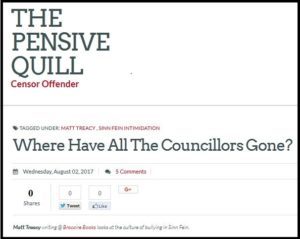 Matt Treacy writes.To read article click here.
Matt Treacy writes.To read article click here.June: Absolutely, yeah. Yeah. And I think as well that, you know – it’s even funny they, like I hear Vincent Browne, I actually like Vincent Browne and I admire him a lot but it’s funny when I’ve seen shows where he has said: But sure Sinn Féin have a very democratic way of electing their party leader. They do in their arse. Do you know what I mean? You’re told who to vote for. You’re told who to vote for all the time. And he’s always the only name. What’s democratic about that? You know I was elected onto the Cúige as Equality Officer, right? We never had a meeting. And they were shocked when they found out I was on it – my organisers. They’re were going mad – how did she get on that? – you know?
And then you’ve councillors carrying out investigations on others. Like there’s nothing independent or transparent about it. But all the complaints in the country go straight up to the same structures. And they still try and say it’s a localised issue and it’s rampant in the country. I know of several other councillors in the country, because we obviously have met through different conferences that, you know, were organised by the party – we do talk and like they have said about their experiences and every one of them had the same kind of systematic abuse – because it’s all I can describe it as – as abuse, you know?
Deirdre: Is it like they try and make you believe it’s not happening?
 Sinn Féin Cllr Séamus Morris
Sinn Féin Cllr Séamus MorrisIndependent.ie
8 September 2017
June: Oh, you think you’ve gone mad. Like, you actually do question your sanity because you think you’ve gone mad. It’s the manipulation. It’s they keep you stringing along. If they think they’ve gone too far there’s like promises made or there’s – you’re treated with extra care or you know you’re just strung along all the time, like. The effects of what I went through with that, like it’s hard for me to admit like, but I had complete burnout after it, like you know, extreme anxiety. You know, you’re walking on eggshells all the time. You’re never told you’ve done a good job. You don’t get support. You’re completely isolated or you’re made to feel that way. You’re afraid to open your mouth in case you say the wrong thing and you’re always waiting to be attacked, you know? So, yeah.
Deirdre: Okay. In terms of the future for you – they asked you when you left the party to resign your seat and you didn’t. Are you going to run again?
June: I don’t know. That’s the honest truth. Like I have options that I have to weight up and see. See what way it goes.
Deirdre: Do you think for the other councillors who left, say Lisa-Marie Sheehy, who’ve I mentioned, she’s only twenty-three, I suppose Sinn Féin has publicised a lot – it’s the youth of its candidates, the fact that it’s had a lot of women, people who are new to politics who maybe wouldn’t be in politics otherwise – do you think that is maybe part of the reason for people leaving? Are they naive? Or is Sinn Féin picking people because maybe they’re not familiar with systems?
June: Well you see like part of the reason, I believe, they pick them so young is ’cause they’re perfect for grooming. And they’re enthusiastic, they’re ambitious, they’re educated. Like, I have seen comments under some Sinn Féin articles where people say, you know, they’re idealistic. What’s wrong with that? You know, what’s wrong with being idealistic and being passionate? They’re very intelligent people, you know? They’re quite capable. You know and they are the future like, so why not? But yeah, it’s just, it’s, I just – I feel sorry, I really do. I worry about people in that party. I couldn’t – I’d an opportunity to run the general election if I wanted. I was told I’d be given the full support of the party and I couldn’t. I couldn’t sit up there and sit down and know, and know, that this is what was really going on, you know?
 Re: Former Sinn Féin TD Sandra McLellan
Re: Former Sinn Féin TD Sandra McLellanThe Journal.ie
18 February 2016
And to work for the people who did that to Sandra still in the party to do it to me? And there was a suspension in the party, and this is very funny: There was a suspension in the party and it was appealed. And there was only – think of it this way – over seventy people interviewed and I know what was on some of those papers and two lines were all that was put to this person. And one was to do with, from what I hear, post – cumainn not delivering posters, leaflets, which is pathetic. And the other one was to do with the ballots in Fermoy, which I actually never complained about. It was a joke. I think that they knew what they were doing all along. They just strung us along. And they played a game. That’s all. They’re masters at it.
Deirdre: What would you say to people who have voted Sinn Féin in the past maybe, as you say, and that surge that happened in 2014 and would be thinking about voting for them again?
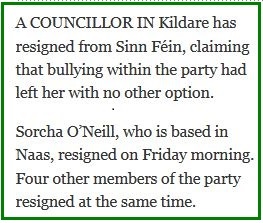 The Journal.ie
The Journal.ie22 April 2017
June: They need to question them, you know? They need to question them. They need to find out what is going on with them like. You know like they just need to be more vocal and – you know, what’s going on? What are you doing? Why is this behaviour continuing? You know, if this is going on in your own party how can you govern a country, you know? They can’t even manage what’s going on in their own party. You know, if they’re willing to treat their own members like that I’d be worried about what way they would treat their – the people on the ground. I have had prominent Republicans say to me if they ever got into power they’d leave the country – they’d rob them blind. You know? Like, their own long-term members know exactly what they’re like. Power and money mad, that’s all. I know people are going to go out there and they’re going to say: Well, politics is dirty, surely she should have known that, surely. Yeah, I know that. But this was at a different level completely. Unnecessary, undealt with by people who are in positions of power who shouldn’t be there. They’re not trained for it. I remember Gerry Adams saying, when the review started, that he would publicly come out. We’re still waiting for that. I’m still waiting to find out the contents or what happened in the review. We were brought, called up, into a room in Barracks Street. Put in the same room with some of the bullies. We were told we weren’t allowed to ask any questions and we were told that some members were expelled, some were suspended. That is the limit of what we were told.
Deirdre: Was there ever any time where you were in fear?
June: There would be occasions alright, you’d think. Like I was told on the phone when they asked for my seat back, they said, the person had said to me: I know you’re not going to give it back, June, but I have to ask anyway. They sent me to ask. And I like, I did get angry I says they can ‘f’ off like. And they said: Look, if you leave Sinn Féin alone – we’ll leave you alone and you can’t open your mouth, he said, because they’ll go after you. They’ll sue you. And then you know, I kind of think: Well I own nothing so let them sue away. I got angry texts, alright, from other members, like members there that, you know, would have served a lot of time in jail – that make you nervous and I got one of them – but they were angry. And I got one telling me never to go inside Charleville again if I knew what was good for me – by a cumann member down there. I was talking to somebody who said: You know, they’re gong to send me to you to look for the seat back. What are you going to do? You know? I said well, you better make sure I don’t get up, you know? Because I’ll come at you like, I’m not – I’m a strong person but that broke me. That absolutely broke me. It took a long time to be able to speak in council. I avoid radio. I was shaking like a leaf knowing I was coming in here today. I avoid newspapers if I can. And yeah, it’s been tough. Very, very tough.
Deirdre: Okay. Councillor June Murphy, thank you very much for coming in. (ends)


Published on October 04, 2017 00:30
October 3, 2017
Sinn Féin And The European Union
 Matt Treacy writing at Brocaire Books looks at the evolution of Sinn Fein's perspective on the European Union. Matt Treacy is the author of A Tunnel To The Moon: The End of the Irish Republican Army.
Matt Treacy writing at Brocaire Books looks at the evolution of Sinn Fein's perspective on the European Union. Matt Treacy is the author of A Tunnel To The Moon: The End of the Irish Republican Army. Four quotes on the European Union:
“Outside the EEC we would still be able to have a close trading relationship with the member states…. We would also regain control over our own economic development and policies.”
“We want a negotiated withdrawal from the EC.”
“Democracy was being undermined by the EC system… we should restore to the people that vital power.”
“The EU is deeply harmful, it is an anti-democratic monster … We are simply allowing our right to self-determination to be stolen from us.”
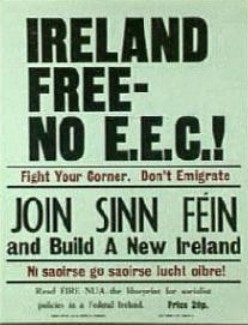
All of the above reflect the core of the critique of the European Union over the past half century and more. However, they emanate from quite diverse sources. The first is from a leaflet issued by Sinn Féin during the 1984 European elections. The second summarises the Sinn Féin position in its manifesto for the 1989 European elections. The third is a quote from former Tory Lord Mayor of London and early advocate of Brexit, Boris Johnson. The last one is from Marine Le Pen, leader of the Front National.
The Sinn Féin position on European union has altered radically over the years. In the aftermath of Brexit it now finds itself in the curious position of having become an enthusiastic supporter of the EU. At its 2016 Ard Fheis which ratified the leadership’s decision to campaign in support of EU membership for the United Kingdom, Martin McGuinness declared: “The future of Ireland, north and south, is in the EU.”
That closed a circle that began in 1961, when Sinn Féin became the first significant political force to oppose the application made by Ireland to join the then European Economic Community. In his Presidential address to the first post ‘border campaign’ Ard Fheis held by a still unified Sinn Féin, Tomás Mac Giolla declared that membership would entail a further loss of sovereignty as well as representing a threat to what there was of an Irish industrial base, and to traditional family farming.
In the event, the Irish application which had been made in conjunction with the British bid fell into abeyance when the British were rejected by Charles de Gaulle in 1963. The application was revived in the late 1960s and its acceptance was ratified by a referendum in the 26 counties in 1972. Both Provisional and Official Sinn Féin were vehemently opposed to membership and were the most vigorous campaigners for a No vote.
Interestingly, a referendum in Norway in 1972 saw a rejection of their application which was overwhelmingly supported by the political elite across the left/right spectrum. One of the reasons for rejection was the perception that Norway would be surrendering control over its successful fishing sector. Irish civil servants and politicians had negotiated a disastrous deal regarding the Irish fishery which some claim has cost the economy billions since accession.
The demand to leave the EU, and eventually the enthusiastic embrace of rule from Brussels, came as Sinn Féin fully embraced constitutionalism in the 1990s. Alongside its effective acceptance of Partition under the Good Friday Agreement, Sinn Féin subtly altered its position on the EU. In 1994 it was praising the potential for “progressive change” in Ireland initiated by European “social charter,” and was calling for increased structural funding. By the time of the next European elections in 1999, one of those channelling Antonio Gramsci had devised the slogan of “critical engagement” with the EU.
So now, not only does Sinn Féin critically engage with Whitehall, the DUP, and even British royalty, it has become as much a devoted advocate of the EU as any of the other main Irish parties with the exception of the DUP.
Britain leaving the EU will of course have serious implications for the whole of Ireland. Sinn Féin now hopes that that will influence sufficient of unionist opinion to support a proposal for a united Ireland in a future “border poll.” The results of the June 2016 referendum in the north, however, showed a significant correlation between the decision to leave or remain, and political representation in individual Westminster constituencies.
Of the eleven constituencies to vote to remain, just four have a unionist MP. Of the seven which voted to leave, all are represented by the DUP. The majority in the north to remain was secured by much larger remain votes in nationalist constituencies and smaller majorities in favour of Brexit in those which voted to leave. Turnout in constituencies that elected Sinn Féin MPs to Westminster was 60.5% compared to average turnout of 64.5% in unionist constituencies.
It is not clear what if any significance that had on the overall result although it might be assumed that a certain proportion of Sinn Féin voters did not vote in the referendum because they disagreed with the decision to support remaining in the EU. Likewise, more affluent unionist voters in constituencies such as North Down and South Belfast were probably more likely than most unionists to vote to remain.
It is unlikely in any event that the vote on Brexit will bring a sea change in attitudes towards a united Ireland of such a scale to ensure a nationalist victory in any border poll. Nor is it likely that such a poll will be held any time in the near future.
The consequences of one part of Ireland remaining in the EU and the other not will indeed present a challenge. That reflects the contradictions of Partition to a great extent. Sinn Féin’s intellectual and political compromises on both Partition and the EU are reflective of those contradictions.
They may claim that they are doing what is required in order to address those contradictions and to exploit them in order to win support for a united Ireland. Part of that compromise, however, has been to significantly concede on the traditional republican position on Irish sovereignty, whether through the country’s relationship with London, or with Brussels.
➽Matt Treacy’s latest book, A Tunnel to the Moon , will be launched in September and is available to buy through the following sites:
Lulu
Amazon


Published on October 03, 2017 12:00
Unionism’s Fear: They Stayed Put & I Can’t Blame Them

Finnian O Domhnaill wonders where unionism tis going. Finnian O Domhnaill is a political writer from Donegal, currently living in Derry. He is the creator of the political page No Bones About It.
On one side you had the hub of an empire that stretched across continents which gave us the industrial revolution, wealth, power and prestige. On the other, abandonment and Fenians.
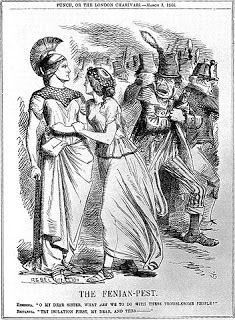
As a man who has a deep passion to see Ireland become truly united and a real sovereign 32 county federal socialist republic, remains sceptical of the British government’s intentions for it’s so called closest friend and sees unionism only as something that stands in the way of seeing a united Ireland to be a reality, I still cannot help but sympathise and recognise as to why those who saw partition as the saving grace to their lives, culture and identity.
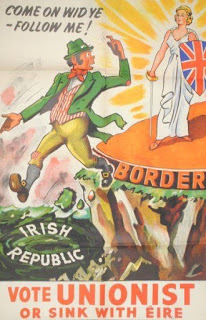
I, as a socialist nowadays, did not always have this view. I was one of those who only seen the glossed over shiny version of the peace process and never had a strong opinion about partition. In fact I more leaned towards it being a good thing. No more bombs and bullets and I could finally go on the pull in Derry without the fear of getting shot or winding up with a protestant because there was peace now and its all good. My naivety back then, poor fella.
As time went on and the more I learned I came to the conclusion that a united Ireland will benefit the whole island and all communities. I also became very bitter towards unionism and all things pro British. I despised the butcher’s apron, John Bull , the queen and all that sort of pomp. I went from a passive novice on one side to somewhat of a republican fundamentalist on the other. To put it simply, I became sectarian but it was ok because my environment supported and encouraged it and my bigotry was justified because ‘’they’’ were the enemy and foreign oppressor.
Fortunately, I found the middle road after continued research and further studies on Irish history, republicanism and Socialism, I realised the real struggle we all face is poverty, class discrimination and inequality. It is still my view that a united Ireland is the best idea for the island but only a 32 county sovereign federal socialist republic. This in turn will allow power to unionism for the whole of Ulster as they previously wanted, pre - partition and grant them to run the show somewhat outside of Irish politics. I believe that unionism has its part to play in this new Ireland.
Unionists/loyalists/protestants should of course have their rights, religion, culture, heritage and customs protected and recognised by the federal government. Although I don't agree with unionism or the North remaining part of the U.K, it is everyone’s inalienable right to practice their identity and if anyone see’s themselves as British then who the hell am I to say they are not or to force them to be Irish or fuck off back to the main land?
Unionism didn’t just pop up over night. There was real reason for centuries as to why many saw union with Britain a good thing. It brought inclusion and industrial development to this rock, straggling hopeless and helplessly at the edge of Europe. Belfast was at the heart of the shipbuilding world, giving us Titanic. It was also the largest city in the whole of Ireland and very wealthy with thanks to Britain.
For those who seen themselves as British and had a protestant faith it can be understandable the fear they had of an independent Ireland disconnected with Britain. Many of those who wanted a free Ireland were Catholic and very much anti British and anti-Protestant. With this in mind many protestant unionists feared that once the connection was broken with Britain, their identity would be denied and be oppressed, their land taken away and feel completely abandoned by their British masters. Where would they belong then?
When the union act was brought in in 1801 this gave Ireland a sort of level pegging with the rest of Great Britain. St Patrick’s cross was added in to the union flag while the harp was added to the sovereign standard giving Ireland the status of not so much a colony or a conquered land subjected to the empire but the empire it self, side by side with England, Scotland and Wales. Britain's struggle was Ireland’s struggle and Britain’s success was Ireland’s success, Ireland’s success was Britain’s success and Irelands struggle was Britain’s. apart from the famine that occurred less than 50 years of union.
When the treaty was drawn up and implemented, It gave the six counties the status quo while giving the 26 counties the title of dominion status of the commonwealth of nations, giving Ireland the new name, Irish Free State. This could of been seen to unionists as a lowering of equal stature with the rest of Britain, global superiority and a return of mere colony status. As we see the superiority complex of DUP members who ‘’hold their noses’’ to the likes of Sinn Fein, you could argue that this mentality runs deep and runs long in the history of unionism.
As the south was dominated by the agriculture sector and was severely underdeveloped compared to the more industrial north, unionists feared their would be a declined in the economy with the British no longer involved and unionist fears that the Irish Government would be concentrating more on the farmer.
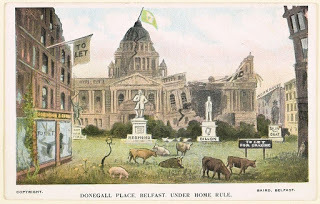 Unionist propaganda of the 'plague' that is an independent Ireland. Notice the huge workhouse sign in the back ground, a symbol of the Irish famine
Unionist propaganda of the 'plague' that is an independent Ireland. Notice the huge workhouse sign in the back ground, a symbol of the Irish famine
When Northern Ireland became its own ‘’wee country’’, the unionists held the overwhelming majority and were able to dictate the destiny of the six counties as well as remaining part of the U.K compared to being a mere minority in the south. Home rule was a definite never for unionism however, a six county home rule was acceptable. The fear of an all island Irish Free State was so stark that they even sacrificed the three counties of Donegal, Monaghan and Cavan. Unionists have always seen Ulster as British but keeping only six counties gave them the majority and dampened their fears of a catholic nationalist rise and a toppling of unionism in the province an a swallowing of the Free Staters.
The years and decades that followed, partition didn't exactly have northern unionists jumping at the chance to join the ‘’republic’’. In 1933, The anti treaty republican party, Fianna Fail led by De Valera, became the minority government with the then socialist Labour party founded by James Connolly. The politicians of the Unionist Alliance dissolved the party in the south and some members joined the pro treaty Cumann na nGaedhael party. This only gave unionism a small voice in the Free State to which it went unheard. The ‘’long fella’’ placed the catholic church in the 1937 constitution as having a ‘’special position’’ in Irish society. Not really something to attract unionists to While James Craig was claiming the North a protestant state for a protestant people.
Of course the main stumbling block of Irish unity which followed partition was the 30 years of conflict were the IRA tried the bomb and shoot their way to Irish unity and in contrast creating a surge in paramilitary loyalism, state collusion, deepening division, fear and rising hatred for anything republican, nationalist, socialist or Irish. To protestants growing up in the north who may not have been at all militant or even pro British now had reason to defend themselves, their family, the union and fight against what they saw as those who were out to destroy their identity, religion and culture.
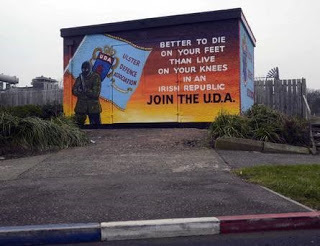
The centuries of unionism’s fear of being isolated and abandoned by the union coupled with the completely undesirable alternative of domination by an Irish catholic majority that would most likely be happy with seeing the demise of the unionist/loyalist/protestant tradition, has trickled down from generation to generation and right up to the present day.
Nowadays there is a greater peace in Ireland through the GFA giving a power sharing Stormont assembly with the DUP being head party in the north and leaving Northern Ireland’s destiny of remaining in the U.K or joining the republic for the people by a democratic vote. Southern Ireland is much more wealthy than the north with a much larger economy and has caught up with the modern world in regards to its dumping of the ‘’special position’’ of the catholic church from the constitution. There has been much improved and greater relations with Britain and is the first country to grant equal marriage. Southern parties are talking and working with unionist parties such as Fine Gael with the DUP and there is more growing north/south relations. The Ireland today is a long way away from the days of plantations were the first Scottish and English settlers felt a million miles from their homeland however, the same fear persists within the unionist community today.
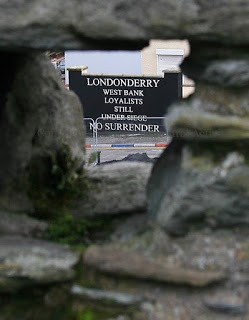
[image error]
As socialists, republicans and as nationalists, we have somewhat a duty that we must always keep in mind, the following: Coupled with the threat of republicanism, nationalism and socialism, a dominated south of the Catholic Church, an underdeveloped economy that was dwarfed by the U.K , its really a no brainer as to why PUL’s never wanted a free Ireland in the past. Its no surprise to me that partition was virtually inevitable even before the 1916 rising nor does it surprise me that even nowadays with Brexit looming, nationalist parties becoming the increasing majority in the north, Irish unity edging closer and an absolute certainty that their rights, identity, culture and heritage will live on in a united Ireland, Unionist parties and their voters will always vote against a united Ireland no matter what the benefits are and no matter what the dire consequences will be in remaining in the U.K. It seems that the cracks are beginning to show that it is not so much a superiority complex or a ‘we are better than you’ mentality nor is it bigotry, stubbornness or even ignorance as to why some PUL’s will never sign up to a united Ireland but rather a fear, the same fear that has been perpetuated for centuries in the heart of unionism and still resonates today which spews out in the form of those rejecting a native language, marriage equality, national unity and inclusion, a bill of rights, equal distribution of wealth and anything else that does not align with ‘’their’’ way of life.
''The oldest and strongest emotion of mankind is fear, and the oldest and strongest kind of fear is fear of the unknown''


Published on October 03, 2017 00:30
October 2, 2017
Why Netanyahu's Departure Will Mean Nothing
 Writing in a September edition of Al Jazeera Stanley Cohen, an attorney and human rights activist who has done extensive work in the Middle East and Africa, stated that:It's been said those who fail to recall the lessons of history are doomed to repeat its mistakes. Built of help and hope, this expression is as familiar as it is simple: knowledge is the gateway to informed transformation and with it, educated change is, necessarily, sure to follow.
Writing in a September edition of Al Jazeera Stanley Cohen, an attorney and human rights activist who has done extensive work in the Middle East and Africa, stated that:It's been said those who fail to recall the lessons of history are doomed to repeat its mistakes. Built of help and hope, this expression is as familiar as it is simple: knowledge is the gateway to informed transformation and with it, educated change is, necessarily, sure to follow.Breaking news: Don't kid yourself. When the chorus of selective history finds its path to be, of necessity, narrow and unbending, it's but a convenient echo of certain repetition.
 Members of the 34th government of Israel pose for a group photo at the presidential compound in Jerusalem on May 19, 2015 [Getty images]
Members of the 34th government of Israel pose for a group photo at the presidential compound in Jerusalem on May 19, 2015 [Getty images] Indeed, time and time again, history does repeat itself. When it comes to Israel, we are, if nothing else, naive, if not slow, learners to believe that enlightened change is either inevitable or just around the corner. It's not, at least not of its own volition.
If reports are to be believed, the reign of Benjamin Netanyahu is now in its final stretch as prosecutors and purchased politicians, alike, line up to see that "justice" be done, and done with ease and smooth political transition. As always, the aim is to remove the bombast, yet, ensure the same old supremacist tune.
Seemingly, a power with many hats, forever - for almost a decade - Netanyahu, as prime minister, has been a storm cloud that has sucked the sheen from the sun wherever his path has taken him. From south Lebanon to the Golan, to Rafah, to the halls of the US Congress, his has been a reckless belligerent trek built of nationalist venture and little else.
Never one to grin in a vacuum, he's long been the ugly, but very real, face of Israel in its march to expand occupation and recast and darken opposition, be they home-grown dissidents or crafted "belligerents" from elsewhere.
Like a steady unbroken drumbeat, supremacist odium has, by design, worked its way into all segments of an Israeli culture that sees kind as weak, just as soft, and equality as something much less than equal.
From the mourn of Deir Yassin, to the wail of Sabra-Shatila, to the level of Jenin, to the final breath of Palestinian infants denied energy to incubate in Gaza, historically each and every act of wanton cruelty has been packaged by Israel as a necessary defence to the willful guile of others. In Israel, no politician can weave their way up the path of power and survive without the hymn of perpetual victimisation. It's become very much the traditional tribal chant.
Indeed, no Israeli leader has worked it better, and been more adept at palpable deflection, than has Netanyahu who, for decades, has found an enemy lurking around each and every corner, even when no such corner exists.
Make no mistake about it: While Israel claims self-defence as a necessity from the ever-present looming hate of others, if there is hatred to be had, it is very much a convenient sale of Israel's own liking and design. To be sure, the mentality of siege dictates that decency knows no reach and avarice no limits. On both fronts, Israel has excelled.
For 70 years, Israeli tropes, whether addressed in Tel Aviv, Brooklyn or Toronto, have mastered the art of self-deception. As almost an obstinate rite of passage, generations of insular, perhaps insulated, Israelis have been birthed on myth. No, not the Holocaust, for it was very real, but the offer that no speech is too vile, no detention too long, no act too extreme once swept up into a sham talismanic call of survival.
The hate that is Israel is not, at all, limited to the handful of political, military or settlement leaders that have flourished in a society whose mantra is "don't ask, don't tell". Like a steady unbroken drumbeat, supremacist odium has, by design, worked its way into all segments of an Israeli culture that sees "kind" as "weak", "just" as "soft", and "equality" as something much less than "equal".
For generations of Israeli leaders, the message, although at times massaged, has essentially remained very much unremitting and uniform in its hymn.
Ultimately, other than the spelling of their names, be it Begin, the wanted terrorist of the '30s and '40s, Sharon, the war criminal covered with the blood of women and children in Beirut and, later, again, in Jenin, or Netanyahu, the proud architect of multiple slaughters in Gaza, deceitful deflection has remained a constant in the halls of Israeli power.
Absent a dramatic shift, don't expect that to change, any time soon, should the current prime minister ultimately find his way to his much-deserved place in the prisoner's dock.
Indeed, waiting in the wings to assume the grand lie are, yet, other scions of a shaded story that began with the romanticised myth of Kibbutzim which, almost magically, blossomed from the sand and evolved its way to the uneasy canard which, today, wraps Israel in the tattered whole cloth of democracy.
Among those surely awaiting their place in the run of ruin is Justice Minister Ayelet Shaked. Recently described as a classic fascist in the tradition of Mussolini, Shaked, of the Jewish Home Party, has long been a critic of individual rights or equality under Israeli law. To her, justice is little more than a legislative doorway to Zionist superiority, with travel limited to only the state's Jewish majority.
Not at all one to run from her very public and proud supremacist wrap, more than once, Shaked has announced the need for a "moral and political revolution" that would smother universal individual rights under the rule of national and Zionist values.
Having long learned that, in Israel, the pathway to political power is seeded with exploitation and pain of non-Jews, Shaked's racist raves have run the hateful course from attacks on "infiltrators from Africa" to her well-known declaration that Palestine must be destroyed because "the entire Palestinian people is the enemy, including its elderly and its women, its cities and its villages, its property and its infrastructure."
Lest there be any doubt about what drives this proposed heir to the Israeli political throne, her vitriolic Facebook screed of 2014 ended with a public embrace of nothing short of outright genocide which "calls for the slaughter of Palestinian mothers who give birth to little snakes."
Not to worry, there is competition galore. Thus stands Naftali Bennett, Netanyahu's former chief of staff who has headed The Jewish Home party since 2012. At various times, Israel's minister of education, minister of diaspora affairs, minister of economy and minister of religious services, Bennett is an ultra-nationalist adored by Israel's explosive and criminal settler movement.
Baring a dramatic change, 70 years of history should leave little doubt about the future of Israel, both in the land that it occupies and, elsewhere, where it has shown scant hesitancy in support of other regimes which, like itself, see abusive power as a virtue and absolute, brutal control as a desired end.
He has not only repeatedly spoken out in support of the unilateral annexation of the West Bank, but opposes the creation of any Palestinian state ... proudly boasting that "I will do everything in my power to make sure they never get a state." On that note, with the election of Donald Trump, Bennett proclaimed "The era of the Palestinian state is over".
Not to be outdone by Shaked's call for genocide, in keeping with Israeli political necessity and tradition, Bennett once bragged, "I already killed lots of Arabs in my life, and there is absolutely no problem with that."
Rhetoric, such as this, might very well mean the end of one's political future in a rational state that sees violence as the final exception to the rule and not the end itself. But in Israel, where bravado and bombast carries with it a seductive political allure and future, it helped to transform Bennett from Manhattan software entrepreneur to firebrand political hero in the eyes of both settlers and secular Jews, alike.
Highly critical of what he considered to be Israel's tepid onslaught in Gaza in 2014 - which killed more than 2,200 Palestinians, most of them civilians, hundreds of them children - Bennett is but another in a generation of Israeli self-apologists who see themselves beyond the reach of humanity, let alone international law.
Indeed, if history is, in fact, a guidepost of what is yet to come, Israel's view of bed-fellows has long been established as not just strange but remarkable for an unbroken marriage of vile and venom which extends back decades.
Thus, Israel's support for South African and Rhodesian apartheid was very public as it provided materials for the building of nuclear weapons or assault weapons and helicopters in violation of UN-imposed sanctions against both. Elsewhere, in Africa, it funded and trained the military forces of brutal dictatorships. It armed the Rwandan military and Hutu militia responsible for genocide against the Tutsis.
In South America, Israel supported Guatemalan death squads, the Contras, Pinochet in Chile, and the military junta in Argentina which disappeared thousands of political opponents including numerous Jewish civilians.
In Southeast Asia and the Pacific Region, it aided the Suharto and Marcos dictatorships. In Iran, the shah's secret death squads (SAVAK) received training from Israel and purchased over $150m in arms from it. Never known for its selfless virtue, Israel was to benefit. The shah was one of the first leaders in the region to recognise it as a state.
Today, while most of the world recoils, in sheer horror, with the sight of the rape, displacement and slaughter of hundreds of thousands in Myanmar, Israel continues to train and arm death squads that have targeted the country's Rohingya Muslim minority for genocide.
Baring a dramatic change, 70 years of history should leave little doubt about the future of Israel, both in the land that it occupies and, elsewhere, where it has shown scant hesitancy in support of other regimes which, like itself, see abusive power as a virtue and absolute, brutal control as a desired end.
Netanyahu will surely go - whether this year or next. In his place will come another in a long, unbroken line of autocrats who see human rights and international law as barriers in their drive to complete the ethnic cleansing of Palestinians started long ago when the Nakba began, early in the morning of April 9, 1948.
Do I believe it will succeed? No. Do I believe fundamental change in a system fuelled by apartheid and occupation will suddenly reverse a steady stalk of hatred through an Israeli ballot box that has long provided a silent pretext for appalling crimes? Of course not.
Yet, ultimately, I remain hopeful that with determined, at times militant, resistance by Palestinians on the ground, along with the support of a growing world community that understands well that silence is complicity, change will come and come in a way that will echo loudly, "From the River to the sea ..."
In the end, I have no doubt the community of nations will run out of excuses, if not time, and finally say enough, and do so in a way which ensures that millions of stateless Palestinians will return home, at long last, to find that aged, rusted keys can still open the doors to equality, freedom and justice.
➽The views expressed in this article are the author's own and do not necessarily reflect Al Jazeera's editorial policy.


Published on October 02, 2017 11:30
Let Young Vote
 The Irish political landscape would be dramatically changed if the voting age was lowered to 14 with Citizenship Studies added to the mandatory curriculum in all post primary schools. In his latest Fearless Flying Column, controversial political commentator, Dr John Coulter, maintains that a British Labour/DUP coalition is just the tonic to make this a reality.
The Irish political landscape would be dramatically changed if the voting age was lowered to 14 with Citizenship Studies added to the mandatory curriculum in all post primary schools. In his latest Fearless Flying Column, controversial political commentator, Dr John Coulter, maintains that a British Labour/DUP coalition is just the tonic to make this a reality.We’re doomed! The immortal words from the deep Celtic accent of Private Frazer from the hit sitcom, Dad’s Army, could well summarise the impending gloom hanging over the Ulster peace process in spite of repeated hints from Dublin that things are being steadily nudged forward.
Stormont seems to be on the slippery slope to formal suspension and the imposition of Tory Direct Rule from Westminster – not that the two main parties would mind! It would bail both the Democratic Unionists and Sinn Fein out of the respective political pits they have tumbled into since January.
The DUP is locked into a deal to prop up the minority Tory Government on essential votes; Sinn Fein doesn’t take its Commons seats and is more interested in becoming a minority partner in the next Dublin administration.
Secretly, it appears these two main power-sharing Executive parties at Stormont don’t want a return of Stormont rule. That’s because there’s so many tough austerity cuts to be implemented in Northern Ireland and neither Sinn Fein nor the DUP want to shoulder the blame for imposing them on health and schools.
The DUP crows about the multi-million pound bonanza it secured for hopping into bed politically with Theresa May, but people on the ground have seen little evidence of this supposed cash boost.
Sinn Fein is more interested in beating the Brexit drum to secure a border poll, but it sees the road to Irish unity as coming from the Dail in Dublin rather than Stormont in Belfast. So could British Labour boss Jeremy Corbyn come up with a workable agenda which could break the Stormont impasse?
Labour – and Corbyn personally – hold a massive ace card; the youth vote. Three revolutionary steps could see a Labour administration back in power for at least a decade – and Stormont back in business in a flash.
Step one – introduce compulsory voting similar to the Australian system. Step two – lower the voting age to 14, yes I said 14! And step three, introduce mandatory lessons on citizenship in all post primary schools and colleges throughout the UK.
Mainstream parties in Northern Ireland are continually yapping on about the need to combat voter apathy and become more appealing to the youth vote. If Corbyn includes my ‘three steps to political heaven’ in his next manifesto, he should sweep into Downing Street faster than you could scream ‘Jeremy for PM!’
And don’t spin me the old record that modern teens are too immature to be given the vote at 14. There’s a lot of very bright young teens in Irish society, who if given the right opportunity, could play a genuine part in bringing common sense politics to Ireland.
I was greatly impressed with the questioning and the level of debate produced by the young folk who participated in the BBC Northern Ireland’s excellent new Wednesday evening TV debate show, The Top Table, ably as always presented by Stephen Nolan.
If ever there was ‘in your face’ evidence of the need to reduce the current voting age, Stephen Nolan presented the living proof. The quality of debate was outstanding, as young people of various backgrounds grilled a range of political figures.
This was excellent cross-generation debating at its very best and if ever political parties wanted to take the pulse of the youth vote, then The Top Table is compulsive viewing.
Critics may point out that Tories and wannabe Labour parties have been crushed in recent Northern Ireland polls as the nationalist and unionist communities rally behind the ‘Big Two’ Orange and Green movements. Unionists have unified behind the DUP, cutting the Ulster Unionists adrift, and Sinn Fein has all but electorally slaughtered the SDLP, the latter once being hailed as British Labour’s sister party in Northern Ireland.
If there’s such political entrenchment in Northern Ireland, how would my Three Steps help Labour, you may well cry?
The fear factor of ‘the others might win’ certainly mobilised many middle class voters, but not the teenage youth vote. Giving poll responsibility to a 14 plus age group will energise a massive number of young people for whom the 1998 Good Friday Agreement is merely a date in their history books.
Ireland has now moved beyond the post-conflict generation into the post-peace process society. The problem is that there are too many political representatives running Stormont who are still part of the society which endured the Troubles.
If Corbyn’s appeal to the teenage youth vote in mainland Britain could be replicated and expanded in Northern Ireland, a whole new political landscape will be created. This will force the DUP and Sinn Fein to take seriously the concept of teen power, and introducing Citizen Studies into the curriculum will ensure those young people not only understand the political process, but develop agendas which are not ‘pie in the sky policies’.
Okay, many post primary schools have had to reduce the number of subjects being offered to make ends meet and balance the books as budgets are consistently squeezed.
But if there is to be real light at the end of the political tunnel, then investing in our children is the solution. To coin a much-used political maxim – our victory will be the laughter of our children.
Sinn Fein has been able to push a Marxist agenda disguised as militant nationalism; the DUP has been able to use its tough Right-wing stance on the Union to hide its soft socialist underbelly in terms of bread and butter issues.
If the 14 plus band cannot influence Sinn Fein and the DUP to bring back devolution, then Corbyn must take up the political cudgels seriously in Northern Ireland and allow British Labour for formally contest elections.
My Three Steps may sound revolutionary and radical, but if the Tories cannot break the Stormont stalemate, will Northern Ireland have to face the pain of school closures, the NHS buckling, and the elderly having to make the stark choice of either ‘heating or eating’? Maybe it will take the agony of Direct Rule to bring Northern Ireland’s politicians to their senses.
The flip side is that if Direct Rule is imposed, and May’s Government falls in spite of DUP MPs, then could a Labour/DUP coalition bring a new breath of fresh air into the logjam?
The big benefit for the 14 plus lobby could be an end to the ‘brain drain’ in Northern Ireland which sees so many talented teenagers leave for good. A ballot paper at 14 could well be the ticket which persuades them to stay.
➽Follow Dr John Coulter on Twitter @JohnAHCoulter


Published on October 02, 2017 01:00
October 1, 2017
Faoi Ghlas
 Anthony McIntyre reviews a book on life in Crumlin Road Prison and Long Kesh in the 1980s.
Anthony McIntyre reviews a book on life in Crumlin Road Prison and Long Kesh in the 1980s.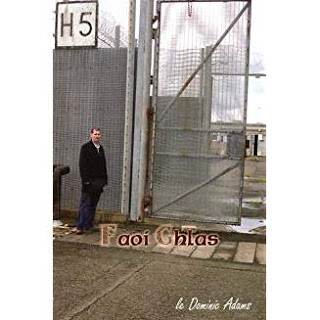
What makes it a great read is the simplicity of the narrative. The author’s ability to tell a story and capture the imagination prompts memories of the skill he brought to H Block soccer matches, a sport with which he had a love affair. Dominic Adams acquired a reputation in prison not for penmanship but for his soccer ability.
In the prison alongside some of the people he mentions in the book - Leonard Ferrin, Brendy Meade, Brian Campbell and Eddie Harkin - he was an outstanding player. All these guys were a joy to watch but not to play against. Their acumen, pace, vision and control made the rest of us aware of our shortcomings.
Upon learning that Dominic Adams had written a book I withheld my judgement in the expectation of reading it at some point. I suspected it would be a party line we all went to jail to further the peace process folksy type thing. I got that wrong. This is one of those good stories that the reader can move through effortlessly. It doesn’t score points or settle scores. The author talks of the people he came across rather than the political perspectives they came to hold. He takes the extra step of apologising to those he felt he was harsh to on the wings because they had pleaded guilty in the courts. That humble attitude comes through in the book. It is refreshingly lacking in hubris.
The path of Dominic Adams was never one that was going to avoid a detour into prison. The community he hailed from, not to mention the family, the brutality of the state all aggregated to carve out a track that conjures up an image of the one that leads into Auschwitz: it is only ever going to one place and there is only ever one destination for those who travel that line. He followed his brothers to prison and another brother followed him. The reader will not be surprised to find the book starting off with the author’s arrest.
There is a wide range of topics broached: his experiences with loyalists including the likeable but late Frankie Curry bring out the multi-coloured tapestry that is prison life; having to witness INLA prisoners knock lumps out of each other during one of the organisation’s incessant rounds of feuding; the animosity that the issue of pleading guilty in courts caused; the dress sense of the inimitable “Basil” Hardy who to Dominic Adams must have looked like something from the land that time forgot; his reading habits which included not only the heavy political but also the omnipresent and almost obligatory Stephen King; the forced moves under cover of darkness of the Red Book prisoners; the post-Blanket prison protests aimed at securing better conditions for the political prisoners who had already established their status as a result of the hunger strikes; prisoner tactics for dealing with governors; the sleepless night of the Gibraltar executions ... and more. All these strands of prison experience might easily resonate with the reader who was in Long Kesh in real time but they can as readily rouse the curiosity of the casual browser.
The author wittily writes of an exchange between two republican prisoners over the teaching of German. For those who knew the men involved it is cause for a real laugh out loud moment rather than one of those shorthand LOL texts. It is worthy of a television comedy sketch.
Dominic Adams’ advice that “every ex-prisoner should record their memoirs, either written or orally” is something that should be heeded by all who journeyed through the cages of Long Kesh. Arguably, Southside Provisional by Ciaran Conway, is most notable for the window it provides on prison life. That great natural story tellers like “Big Harry” McCavanagh or “Wee Larry" Marley" should have gone to their graves without having marked the literary spot has left us gazing at a blank space on the map of first person history that can now never be pencilled in.
Danny Morrison in the blurb has suggested that Faoi Ghlas fits in with the established canon of republican prison literature. But there is more to it than that. It could easily slot into a much wider canon of prison literature and inspire prisoners in jails anywhere to maintain diaries as they serve their time. There is a story in each of us. The author of Faoi Ghlas has shown the merit in bringing it out.
Proud of his mother, devoted to his kids, Dominic Adams wrote the book with his children (and her grandchildren) specifically in mind. There is a photo of him walking around the yard with his daughter. I found that deeply poignant and it brought back memories of when I took my own son into the very cell where I had been on protest during the years of the Blanket. There is something hugely rewarding about that.
Now that I have finished it Faoi Ghlas and before it takes its place on the bookshelf, the person next in line to receive it is my own daughter.
Dominic Adams, 2016, Faoi Ghlas. Publisher lulu.com. ISBN-13: 978-1365538360


Published on October 01, 2017 09:30
Why Is The Bible False?
 From Atheist Republic an exchange of views on the falsity of the Bible.
From Atheist Republic an exchange of views on the falsity of the Bible.Our forums generate great questions and insightful responses and are a good place to go for conversation with smaller groups of people. In addition, anyone is welcome to join our forums so there are opportunities for conversation and debate with theists.
One question in the debate room brought up by a Christian (Lutheran) member who goes by the name zfoor was:
...I've just been taking some time to test my beliefs...[according to atheists] what makes the Bible false?” This question, in various forms, is a one we hear quite a lot, and a type of demand many of us get from theists. Something along the lines of “ok, so if you think my holy book is a lie, tell me why you believe that.”
Jeff Vella Leone spent some time responding to that and subsequent questions:
That is not the right question if you are objective about it. The right question is; What makes it truth from other books like lord of the rings, etc…?
Both books have dragons, and both books have suffering and the rest. Why do you actually believe one and not the other? Is it just because it was forced upon you when you were kid? or just because everybody else around you believes it? Or because it is 2000 years older? Or because Jesus seemed a nice guy? Would you be a Christian if you were born in India? This question alone would let you know that all the reasons that you think Christianity is the truth fall apart. Simply because your truth is not build on critical thinking which is universal but on faith/gullibility to whoever is/was in power in your area. Although I can go on and prove to you that Christianity is a fraud but for now just think about what I said."
zfoor:
These are interesting points, but first, I must say being objective is entirely impossible. Also, I will not deny my location of birth and environment growing up being a result of my faith as it is today in any way. However, being born in India or into a non-Christian family does not make Christianity false. Likewise, you have to remember here that we are not talking about innocent people in India, or wherever; all people, myself included, are sinful and deserve damnation according to the text. I'm not sure what you mean by "2,000 years older," but I assume you mean "Do you believe in it because it existed for an extensive amount of time, and for a large period of that time, claimed to be truth by a sizable amount of the population?" If that is the question, I would say yes, of course, but that is not what my belief is built on as much as it is a branch from the tree. As for Jesus being a nice guy, no, that is not a contributor. There are lots of "nice guys."
Lastly, we cannot know who is gullible until we know the answer to our origins, can we? My understanding of truth is very much built on critical thinking, as critical thinking does not always give you a right or wrong answer, but I digress. In truth, I probably think about this more than anything else--the meaning of life and is my understanding of it correct--I've tried to prove it wrong myself, trust me. But I can't answer where our morals come from, why I (and every other person) is practically born wanting to know if there is a God and where we come from, our sense of guilt and our conscience, how mere chance created us, and how nothing became something. I mean to say the entirety of the text. One issue I continuously run into when hearing out an atheist's viewpoint is their pointing to how the Bible says to sacrifice animals, how an all-powerful God would give us more insightful instructions, and the absurdity of all these laws in the Old Testament that are nowhere to be found today. This is frustrating to me, as the New Testament frees us from the Law of the Old through faith in Christ's sacrifice. Now, the aforementioned is more for clarity of my stance than part of my argument, though you may know that as I'm sure you're informed, but I want to make it clear. So, let's start with the story of creation in Genesis if you don't mind, right from the beginning.
Jeff Vella Leone:
,,, can't you look at the bible and treat it as if you never heard of the book before and read it afresh? Forget what you have learned and you would be objective. Trust me once you start reading it you won't recognize it. In genesis god invents shadows and light before he makes the sun. If i didn't point it out, you would not even realize it because when a Christian reads the bible just does not read it objectively. Now do you think that without the sun, there could be light?
Don't you think that a benevolent god would not create you sick and demand you to be well? This idea that god needs to test you does not fit well with the idea that god knows everything, since then he would not need to test you at all, he would already know the result.
...You don't need to know your origins to be able to think critically. That is a fact. Our morals grow with time and knowledge, that is why in the past slavery was ok and now is not ok. Christianity supported slavery since at the time it was a moral thing to have. So Christianity was built on the current morals and did not give moral teachings at all.
we are born hungry for knowledge, that is true. But god does not answer those questions, science is the only path to discover those answers with time...it is bad to attribute to god things that we don't know or understand yet.
We don't know if we were created by chance or not, whoever says that is assuming a lot of things. We still don't know the answer for that and it is OK to say that we don't know. Saying god did it really answers nothing since we don't know which god or what god is.
Other people gave great feedback to this individual and the conversation branched out and continued for quite some time. If this type of engagement is interesting to you, please register for our forums and participate! We’d love to see you over there.


Published on October 01, 2017 01:00
September 30, 2017
The Big C
TPQ regular Sean Mallory reflects on the death of a loved one taken by cancer.
From several years ago, I recall a television series entitled The Big C starring Laura Linney as the character Cathy Jamison and Oliver Platt as Paul Jamison.
In our home and at that time we thought it was funny and entertaining. That was that time and now is now. Our home is different.
Recently, a member of my own family, having initially been diagnosed with cancer and after a very brave fight succumbed to the disease’s terminal effects and much to our anguish and heartbreak passed away.
Like Linney's character Cathy, she was also a mother, but not of one, but of four young children. And also like Cathy, she was young. Too young.
There are so many comparisons with The Big C and yet so many contrasts. The fun aspect being the most obvious disparity.
Cancer is not funny irrespective of how it is approached. In fact it is brutally unambiguous in its prognosis and it is only through personal experience that we come to understand just how bloody horrendous it really is.
It is a disease that alerts us to our own fragility and in its course of destroying its host, its attack ultimately leads to its own self-destruction. Not only does it strip the life out of the victim, but it rips the heart and soul out of the immediate family, relatives and friends. There never is just the sole victim and it leaves behind an awful trail of grief, regret and a terrible sense of injustice and the inescapable Why?
Like The Big C, Cathy and Paul's protection of their son Adam from such harrowing news, from her initial diagnoses, her children were not fully informed of the terminality of their mummy's illness in order to save them from any anguish or distress.
But like Adam, they realised as her treatment went on that something more serious was afoot and it was towards the end that they fully grasped the serious nature of her illness.
The one aspect of The Big C that portrayed as true a reflection as possible of the disease is the scene where Cathy finally succumbs to its eventuality. Surrounded by her family, who having like most families when faced with this condition, having spent the time from diagnosis to her actual passing, seemingly in denial and full of desperate hope, openly acknowledge her eventual demise with their tears and cries of despair. The scene ran counter to the satirical theme of the series and only through experience we understand now why.
When you have sat in a hospital room and watched children beg their mummy not to go and her husband declare his undying love through tears of despair and desperation you fully understand that scene. Unlike reality The Big C ended there.
After the wake, the funeral and the initial mourning, when all those paying their respects leave to continue their own lives and the house quietens down, eyes sore from tears, you are alone. It is then that the full impact of the ‘Bean an tí’s passing fully hits home.
It's her living room
It's her curtains
It's her wall paper and paint
It's her kitchen
It's her sink
It's her cooker
It's her kettle
It's her cups
It's her shopping in the cupboards
It's her washing machine
It's her shoes by the sofa
It's her sofa
Simply, it's her home.
At times you catch yourself turning to ask her a question, expecting her to be in her usual place doing her usual thing but only to find an empty space. No more her laughter, no more her smile, no more her warm welcome or no more her regretful goodbye.
As the days pass by she's in and out of your mind, popping in and out at odd times, and you think of her family left behind. Tears suddenly well in your eyes to be quickly wiped away to avoid embarrassment in public places. A phenomenon a friend of my explained that would continue for several years. A death is very hard to live with but we learn to cope but never get over it.
Later while scrolling through your phone you come across her number, her message trail and her e-mails, her Whatsapp, her Facebook and her Instagram - Still alive in a virtual world.
You think to yourself, what you wouldn’t give for your phone to beep one more time.
Cancer is a bitch.


From several years ago, I recall a television series entitled The Big C starring Laura Linney as the character Cathy Jamison and Oliver Platt as Paul Jamison.
In our home and at that time we thought it was funny and entertaining. That was that time and now is now. Our home is different.
Recently, a member of my own family, having initially been diagnosed with cancer and after a very brave fight succumbed to the disease’s terminal effects and much to our anguish and heartbreak passed away.
Like Linney's character Cathy, she was also a mother, but not of one, but of four young children. And also like Cathy, she was young. Too young.
There are so many comparisons with The Big C and yet so many contrasts. The fun aspect being the most obvious disparity.
Cancer is not funny irrespective of how it is approached. In fact it is brutally unambiguous in its prognosis and it is only through personal experience that we come to understand just how bloody horrendous it really is.
It is a disease that alerts us to our own fragility and in its course of destroying its host, its attack ultimately leads to its own self-destruction. Not only does it strip the life out of the victim, but it rips the heart and soul out of the immediate family, relatives and friends. There never is just the sole victim and it leaves behind an awful trail of grief, regret and a terrible sense of injustice and the inescapable Why?
Like The Big C, Cathy and Paul's protection of their son Adam from such harrowing news, from her initial diagnoses, her children were not fully informed of the terminality of their mummy's illness in order to save them from any anguish or distress.
But like Adam, they realised as her treatment went on that something more serious was afoot and it was towards the end that they fully grasped the serious nature of her illness.
The one aspect of The Big C that portrayed as true a reflection as possible of the disease is the scene where Cathy finally succumbs to its eventuality. Surrounded by her family, who having like most families when faced with this condition, having spent the time from diagnosis to her actual passing, seemingly in denial and full of desperate hope, openly acknowledge her eventual demise with their tears and cries of despair. The scene ran counter to the satirical theme of the series and only through experience we understand now why.
When you have sat in a hospital room and watched children beg their mummy not to go and her husband declare his undying love through tears of despair and desperation you fully understand that scene. Unlike reality The Big C ended there.
After the wake, the funeral and the initial mourning, when all those paying their respects leave to continue their own lives and the house quietens down, eyes sore from tears, you are alone. It is then that the full impact of the ‘Bean an tí’s passing fully hits home.
It's her living room
It's her curtains
It's her wall paper and paint
It's her kitchen
It's her sink
It's her cooker
It's her kettle
It's her cups
It's her shopping in the cupboards
It's her washing machine
It's her shoes by the sofa
It's her sofa
Simply, it's her home.
At times you catch yourself turning to ask her a question, expecting her to be in her usual place doing her usual thing but only to find an empty space. No more her laughter, no more her smile, no more her warm welcome or no more her regretful goodbye.
As the days pass by she's in and out of your mind, popping in and out at odd times, and you think of her family left behind. Tears suddenly well in your eyes to be quickly wiped away to avoid embarrassment in public places. A phenomenon a friend of my explained that would continue for several years. A death is very hard to live with but we learn to cope but never get over it.
Later while scrolling through your phone you come across her number, her message trail and her e-mails, her Whatsapp, her Facebook and her Instagram - Still alive in a virtual world.
You think to yourself, what you wouldn’t give for your phone to beep one more time.
Cancer is a bitch.


Published on September 30, 2017 11:00
State Murder Conspiracy Down To The Finest Detail
 Via The Transcripts Stephen Nolan talks to Miami Showband member, Des (McAlea) Lee, about the victory in the High Court when it ordered access to the intelligence documents that contain vital information about the murders of band members Fran O’Toole, Brian McCoy and Tony Geraghty.
Via The Transcripts Stephen Nolan talks to Miami Showband member, Des (McAlea) Lee, about the victory in the High Court when it ordered access to the intelligence documents that contain vital information about the murders of band members Fran O’Toole, Brian McCoy and Tony Geraghty.Des Lee The Nolan Show 11 September 2017
The Nolan Show
BBC Radio Ulster Audio Player
Stephen: Top security chiefs have been ordered to disclose intelligence files relating to the Miami Showband massacre. It’s understood the documents will contain information on the UVF (Ulster Volunteer Force) Commander, Robin ‘The Jackal’ Jackson. It’s believed he was involved in the Miami Showband attack and dozens of other murders of Catholics but was never convicted of any of the crimes. The last two survivors of the Miami Showband murders were in court for the ruling recently. I’ve been speaking to one of the survivors, Des Lee, and I’ve asked him for his reaction to the order to disclose intelligence files.
 Des Lee
Des LeePhoto: Belfast Telegraph
Des: I think it’s fantastic, Stephen. We’ve been fighting now for forty-two years It’s a long, long time to get justice. And I must be very honest – I cried tears of joy in court. It’s the first time in forty-two years that I saw serious progress. You know, the High Court has directed that more than eighty categories of documents are to be made available. Now that is absolutely fantastic. There’s obviously other documents which our legal team require which they, the defendants, have been given ten weeks to come up with those files which will run into November. The defendants could still try to retain some files but we’re hoping that – the judge has given a clear indication to them that he definitely wants them released. And we’re hoping and praying that that does happen, Stephen.
Stephen: How important is this to you, Des?
Des: Extremely important, Stephen. You know, I’ve been fighting for forty-two years to get justice for Fran, Brian and Tony. You know, what they went through was not– it wasn’t murder – it was a massacre that they went through. And I’ve been fighting and I will fight ’til the day I die. There are several things that I want to happen: I want the court case to be finalised and we get justice which, hopefully, will be in 2018. I also want to see a monument erected in Northern Ireland to Fran, Brian and Tony which we’re working very, very hard on at the moment and it does look like that is going to happen. And of course I am working on my book at the moment which is called: My Saxophone Saved My Life which is a true story. So there’s a lot of things actually going on. Meantime, there’s also a major entertainment company making a documentary on The Miami which is to be released worldwide.
Stephen: Tell me about, more about, that night back in 1975 to remind people why this is so important to you.
 The Miami Showband
The Miami ShowbandDes: We were playing in the Castle Ballroom in Banbridge.It was a normal dance with people from all colour, all creeds – which was what The Miami was all about. You know The Miami was a band that traveled North and South of Ireland entertaining people right across the board to give them two hours of fun during that horrible period in Northern Ireland. Now we’d done the dance in Banbridge and as normal at the end of the night we’d come down and we’d have a chat with the girls, we’d sign autographs and that sort of thing, talk to the guys as well and see that enjoyed the dance then we would proceed to have some tea and sandwiches before we hit the road. Now our Road Manger, Brian Maguire, had agreed that he would go ahead of us – he had packed all the musical equipment – and two girls had asked us for a lift and we suggested that Brian take them. Thank God he did! And Brian took the girls down to, they wanted to go to Newry. Now we had had our tea and our sandwiches, we got in the van and we headed down towards Newry and we came upon what we thought was a normal roadblock at Bessbrook, sorry, not Bessbrook – at Buskhill – and we thought it was a normal roadblock and we were flagged down. And we were asked to get out of the van and face the ditch, which we did. And then the normal questions would have been asked which was things like: date of birth, where you’re from, where you were coming from, where you’re going to – all that type of normal stuff.
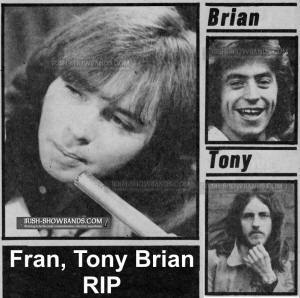 Photo:
Photo:irish-showbands.com
And basically we didn’t see anything untoward or feel there was anything untoward until two of the gang went to the van to actually put a ten pound bomb into the van which exploded prematurely and that blew me into the ditch where I lay face down in the grass and I remember watching Viet Nam war movies where the GIs would lie face down and hold your breath for as long as possible and all I could hear all around me was screaming, crying, shouting. There was gunfire, there was – the ditch was on fire because the van had exploded and set the ditch on fire and the ditch was coming closer and closer to my body and I realised that if I didn’t get up at some period I would have been burnt alive. So I called out the names of Fran, Brian and Tony. And I got no answer. I called out: Stephen! And Stephen was moaning. And I said to Stephen that I’m going to Newry to get us help. And I basically realised if I don’t go now I’m gonna be burnt so I made a run for it. And I ran up the ditch up onto the main road – there was a lorry with a trailer and there was two gentlemen in the front, in the front section, in the cab section, of the lorry. I asked them would they take me into Newry and they refused. And I said: Well look, I’ll get on the trailer on the back. And they still wouldn’t let me. A young couple came along in their car and they agreed to take me into Newry Police Station and of course at that stage I didn’t trust anybody so I had my hand on the handle of the door and in case they weren’t going in towards Newry I was ready to jump out of the car. But thank God they actually did take me into Newry where I was able to raise the alarm.
Stephen: Time will tell now whether these documents will be the game-changer, Des.
Des: The intelligence files are very, very important, Stephen, especially the one on ‘The Jackal’ Jackson. As you know he was a notorious UVF Commander and a suspected RUC (Royal Ulster Constabulary) Special Branch agent linked to scores of murders. Now it is also claimed that his fingerprints were found on a gun that was used to kill Fran O’Toole so you know obviously a lot of this, these files, are very, very important in our case.
Stephen: And you’re still hopeful after all these years of getting justice?
Des: Oh! Of course! You know, the fact of the matter is, Stephen, we got convictions – we got two convictions. We got the fact that it was collusion. So you know – it was an arrangement between the RUC at the time, the British Army and the UDR (Ulster Defence Regiment). They had conspired to murder The Miami Showband and it was done down to the finest detail: where they got the military hardware, where they got the uniforms, it was – when you actually see our documents that were given to us by the HET (Historical Enquiries Team) and when you look through those documents it is just mind-blowing what is in those documents as to exactly what they done. And for what they done to Fran, Brian and Tony, to me, my wife, my children the families and their friends, you know – we want justice. But what I – one of the things I feel very, very sorry about today, Stephen, is the fact that there are so many families out there today who will never see justice – which is terrible! You know you take the Dublin-Monaghan, Omagh bombings and several other cases that will never see the light of day. We are just blessed that before the HET collapsed that we got the convictions and we got the collusion – so I’m very happy about that.
Stephen: Okay. Des, thank you very much indeed. Thank you for that. (ends)


Published on September 30, 2017 00:00
September 29, 2017
Radio Free Eireann Broadcasting 30 September 2017
 Martin Galvin
with details of this weekend's broadcast from
Radio Free Eireann.
Martin Galvin
with details of this weekend's broadcast from
Radio Free Eireann.
Radio Free Eireann will broadcast this Saturday September 30th on WBAI 99.5 FM radio or wbai.org at 12 noon New York time or 5 pm-6pm Irish time; or listen any time after the broadcast on wbai.org/archives.
Broadcaster, author and journalist Malachi O'Doherty will be interviewed about his new book, Gerry Adams: An Unauthorised Life.
Truth Will Out
Mairin Ni Ghadera, a journalist with RTE'S Raidio na Gaeltachta,will speak about the launch of a new book celebrating the life of journalist, historian, Irish language activist and frequent Radio Free Eireann voice Nollaig O'Gadhra.
Co-host John McDonagh will update us on final preparations for his one man show, Off The Meter, On The Record, set to premiere at the Irish Rep Theatre.
John McDonagh and Martin Galvin co- host.
Radio Free Eireann is heard Saturdays at 12 Noon New York time on wbai 99.5 FM and wbai.org.
It can be heard at wbai.org in Ireland from 5pm to 6pm or anytime after the program concludes on wbai.org/archives.
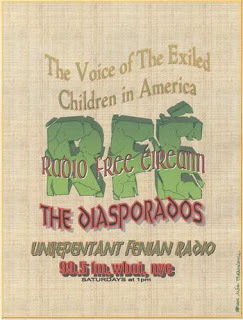


Published on September 29, 2017 13:00
Anthony McIntyre's Blog
- Anthony McIntyre's profile
- 2 followers
Anthony McIntyre isn't a Goodreads Author
(yet),
but they
do have a blog,
so here are some recent posts imported from
their feed.



